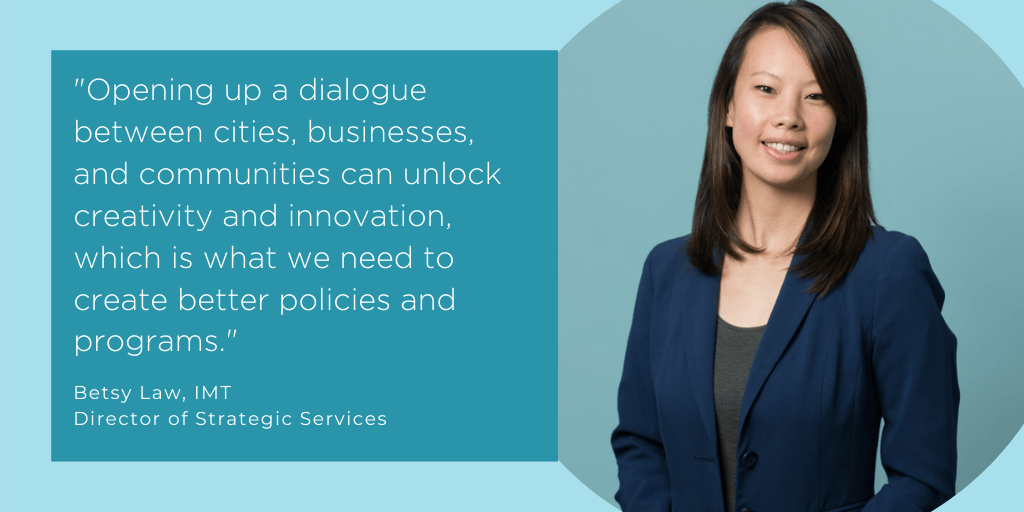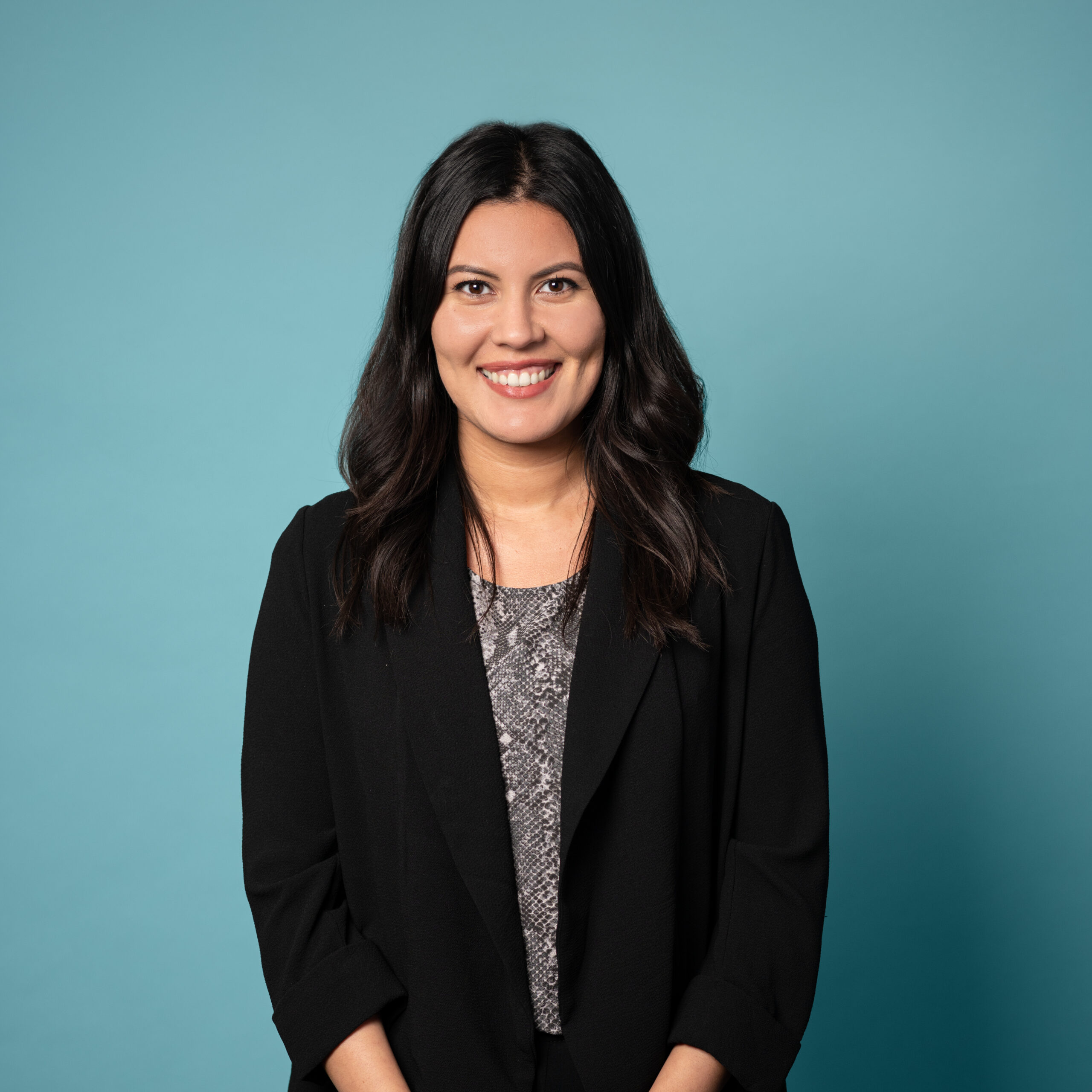Driving large-scale impact for any organization requires inclusionary and equitable approaches to stakeholder engagement and project leaders that take into account the people and community impact of their work. Over the past year, Betsy Law, IMT’s Director of Strategic Services, has spearheaded IMT discussions about the social challenges that touch upon IMT’s building performance work with the goal of prioritizing diversity, equity, and inclusion (DEI) initiatives and leading staff to think, and work, creatively.
In this Q&A, Betsy breaks down the importance of bringing diverse voices and backgrounds to the table to create better policies and programs that benefit present and future generations.

What is one defining moment in your life when the reality of climate change became personal to you and how does your current role at IMT address some of these climate challenges?
I was born and raised in Southern California, near the foothills of the San Gabriel Valley, where we experienced very dry heat during the summers and received sporadic rain. My family didn’t have a functioning air conditioner and we were fine without it for some time. During the ’90s, large wildfires were infrequent. But that really took a turn a decade later. Summers became hotter and the number of large wildfires increased. My dad finally installed a window air conditioner for the master bedroom where we would all sleep because the cool air didn’t reach the rest of the house. He didn’t want to install central air conditioning and pay a higher cost for electricity.
I learned a lot about global climate change and the energy sector during my time at UCLA as a geography and environmental studies major. I studied the negative effects of pumping large amounts of greenhouse gas emissions and pollutants into the atmosphere. For California, the effects were prolonged heatwaves and droughts to fuel the wildfires. I landed my first job in sustainability in 2008 and had to work from home for two weeks because the ashes from a nearby wildfire blanketed my neighborhood and the entire region. It was suffocating and we barely saw sunlight. I have a hard time pinpointing exactly which one it was because there were thousands of cases in California that year. The news outlets continued to cover the devastation that the wildfires left behind year after year. People were losing their homes and communities, and suppression efforts were costing hundreds of millions of dollars.
I knew I wanted a career addressing climate change and that motivated me to take my position here with IMT. Now, I keep the wheels turning at IMT by maintaining a strong organizational foundation and implementing best practices in management. This includes building capacity to match programmatic and strategy needs to support my colleagues. We’re working hard to tackle climate change by solving some of the most challenging issues and driving meaningful action in cities and the real estate industry.
Over the past year, you’ve been leading a lot of internal efforts on diversity, equity, and inclusion (DEI) initiatives and making this central to IMT’s work and mission. What has this experience been like for you and what have you learned along the way?
I’m an Asian American working in a field that is predominantly white. So naturally, I had my own doubts about whether or not I could successfully implement meaningful DEI initiatives that my colleagues would support. To get past those doubts, I connected with other professional peers that really cared about DEI and worked on changing my own perceptions, challenging my own biases, and finding time to heal and recharge, which I still continue to do. Learning from others outside of my organization helped build my confidence and strengthen my understanding of DEI issues and change management solutions.
Shifting an organization’s culture is hard and can take a long time because you’re asking people to think differently and to step out of their own comfort zone. Last August, almost half of IMT staff and a few board members took a trip to Montgomery, Alabama to visit the Equal Justice Initiative Museum and Memorial and to participate in a learning workshop on systemic racism. It was a life-changing experience for all of us and we were vulnerable and open to having difficult conversations. I’m really proud of everyone at IMT because we approached our equity work with openness and willingness to change in the last six months. It’s important to acknowledge that each person will be at a different stage of their learning journey, and that’s okay.
“‘I’m really proud of everyone at IMT because we approached our equity work with openness and willingness to change…”
What do you see as the biggest hurdle non-profits face in regard to equity and diversity in the workplace? Where can non-profits go-to for resources to make this work easier and more feasible?
I think that getting commitment and investment from senior management, board members, and staff is the biggest hurdle to overcome. That includes competing for staff time and resources against other organizational priorities. You have to make the business case for incorporating DEI into your organization’s DNA and hold staff accountable for meeting the goals that are established. The best way to jump into the work is to start a conversation by connecting with local equity organizations, community networks, or consultants. It’s a great opportunity to swap success stories, troubleshoot issues, and share resources. In addition, there has been a growing number of DEI events, workshops, and working groups. Many foundations are providing DEI capacity building opportunities to their grantees. IMT has been participating in the Equity Training Program supported by Kresge Foundation, which has been extremely valuable.
In D.C., I’m a member of a working group co-facilitated by The Collective Good, which consists of local nonprofits, consultants, and foundations that are committed to advancing DEI within their organizations. It’s organized by The Center for Public & Nonprofit Leadership at Georgetown Public Policy Institute and anyone can participate. The Center published a useful report, Advancing Racial Equity within Non-profit Organizations, that provides research, examples, resources, and lessons learned on implementing DEI. I also often refer to the toolkit, Advancing the Mission: Tools for Diversity, Equity, and Inclusion, funded by the Annie E. Casey Foundation, that presents an in-depth case example with concrete action items.
Why is it important for IMT and other environmental organizations to value diversity and equity in climate action work, both internally and externally?
For any organization, especially mission-driven organizations, it’s important to center people and communities in our conversations and our work. Some policies and programs are developed by a select group of decision-makers that benefit a select group of people—these decisions and the results of these policies and programs tend to affect disadvantaged or under-resourced populations as well, but they are often excluded from the entire policy development process or play a very minor role. That leaves a huge knowledge gap with the potential to miss some critical points that may not be apparent to those that are deep in the weeds in building performance or energy efficiency work, for example. Opening up a dialogue between cities, businesses and communities can unlock creativity and innovation, which is what we need to create better policies and programs. The same goes for hiring diverse staff in the workplace to bring different cultures, perspectives, and life experiences to the table. I’ve seen a change across the board as organizations, government, and businesses begin to operationalize inclusive and diverse stakeholder engagement processes. IMT is starting to do that, but there is still a lot of progress to be made.
To read more stories from women changing the world of energy efficiency, check out our Women in Energy Efficiency blog series!
